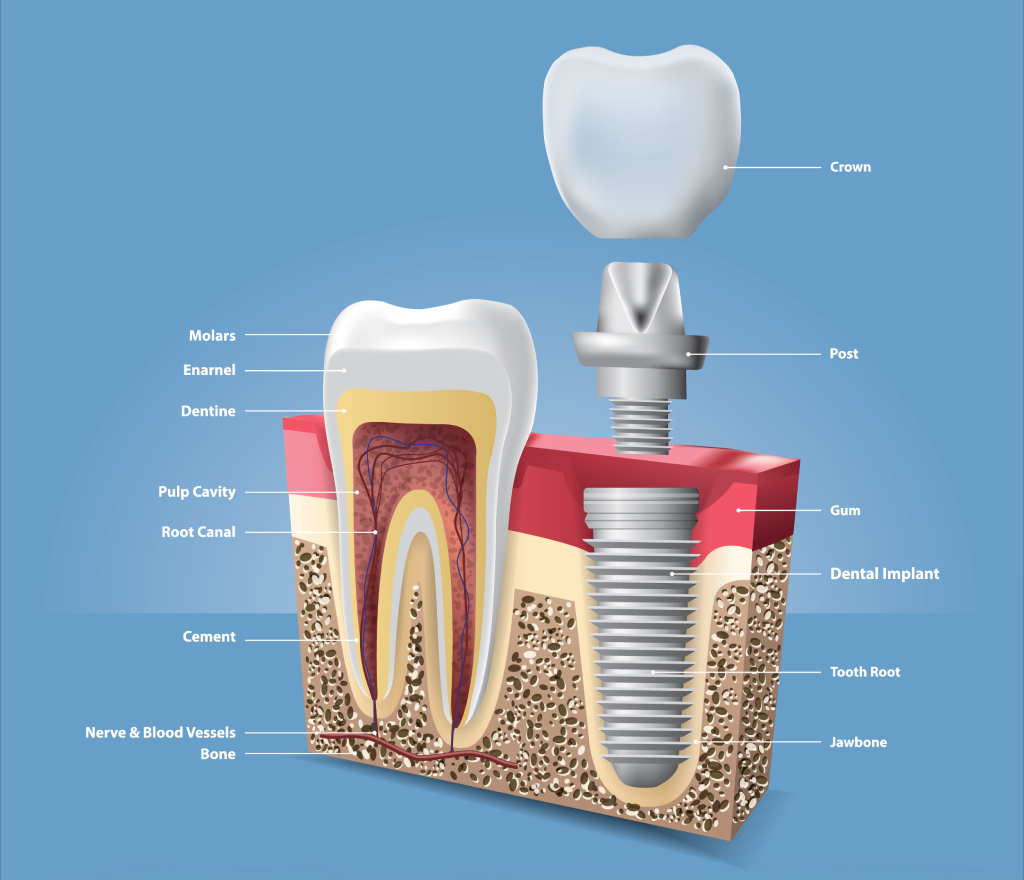services
Dental Implants
Missing a tooth due to injury or disease can lead to rapid bone loss, difficulty chewing, and even changes in speech—all of which can negatively affect your confidence and quality of life. At Restore Dental, we provide advanced dental implant solutions that restore both function and aesthetics.
Dental implants are metal posts or frames, typically made of titanium, that are surgically placed into the jawbone to act as artificial tooth roots. Once integrated with the bone, a connector called an abutment is attached, which extends above the gum line to support a custom-made crown or bridge.
This modern tooth replacement option closely mimics the look, feel, and performance of natural teeth, offering a stable, long-lasting solution that enhances oral health and helps maintain bone structure. Whether you’ve lost one tooth or several, dental implants at Restore Dental can transform your smile and improve your overall well-being.
Unlike dentures or bridges, dental implants do not rely on surrounding teeth for support, making them a more conservative and durable solution. They help preserve the jawbone by stimulating bone growth, which prevents the sunken facial appearance often associated with tooth loss. At Restore Dental, our expert team, specializing in dental Implants in Gurgaon, uses cutting-edge technology and personalized treatment planning to ensure your implants blend seamlessly with your natural teeth—offering both functionality and a confident, lasting smile.

What is the dental implant?
Dental implant surgery is a procedure that involves replacing missing or damaged teeth with artificial ones that look, feel, and function like natural teeth. The process uses metal, screw-like posts that act as artificial tooth roots. It’s an ideal option for people who struggle with uncomfortable dentures or those whose jawbones cannot support bridges or dentures effectively.
The approach to implant surgery depends on the type of implant and the condition of your jawbone. Often, it involves multiple stages. One of the greatest advantages of dental implants is the strong, stable foundation they provide for replacement teeth. However, this stability depends on a healing process called osseointegration — where the bone fuses with the implant — which can take several months to complete.
Overall, dental implants offer a long-term, reliable solution for restoring your smile and oral function.
How long do dental implants last?
Dental implants are designed to be a long-term solution, with a success rate of 90–95% over a 10-year period. In many cases, they can last 20 years or even a lifetime. However, it’s important to note that while the implant itself (the titanium post placed in the jawbone) is highly durable, the crown placed on top may not last as long.
After the implant fuses with the jawbone — a process that typically takes several months — a connector piece called an abutment is attached. This abutment extends above the gumline and supports the dental crown.
Crowns typically last between 15 to 20 years, with studies showing 50–80% survival rates over that period. Because crowns endure everyday chewing and biting, they are more susceptible to wear and tear than the implant beneath. Fortunately, crowns are more affordable and easier to replace compared to the implant post.
While dental implants are generally reliable, failures can still occur — sometimes months or even years after placement. Factors like oral hygiene, bone health, smoking, and overall medical conditions can all influence the longevity of the implant system.
How painful is getting a dental implant?
You shouldn’t experience pain during the dental implant procedure, as your dentist will numb the area with local anesthesia to keep you comfortable. However, it’s completely normal to feel mild discomfort, swelling, or tenderness once the anesthesia wears off. These post-surgery symptoms are temporary and can typically be managed with over-the-counter (OTC) pain relievers as recommended by your dentist.
What are the three types of dental implants?
Dental implants are a long-term solution for replacing missing teeth, and choosing the right type depends on your oral health, bone structure, and personal needs. There are three primary types of dental implants: Endosteal, Subperiosteal, and Zygomatic. Here’s a breakdown of each:
1. Endosteal Implants
The most commonly used implant type. These implants are shaped like small screws and made of biocompatible materials like titanium. They are surgically placed directly into the jawbone.
Key Benefits:
- Strong Stability: Anchored securely in the jawbone, ideal for replacing single or multiple teeth.
- Long-Lasting: With proper care, they can last a lifetime.
- Natural Functionality: Provide a realistic appearance and allow normal chewing and speaking.
2. Subperiosteal Implants
An option for patients with minimal jawbone height. Instead of going into the jawbone, these implants rest on top of the bone under the gum line. A custom metal frame holds the implant in place.
Key Benefits:
- Ideal for Shallow Bone: Suitable for patients who can’t support traditional implants due to bone loss.
- Less Invasive: No drilling into the jawbone; results in faster healing.
- Improved Denture Stability: Often used to secure removable dentures more firmly.
3. Zygomatic Implants
Designed for severe upper jaw bone loss. These implants are anchored into the cheekbone (zygoma) instead of the upper jawbone and are the least commonly used type.
Key Benefits:
- Perfect for Severe Bone Loss: A viable solution when traditional implants aren’t possible.
- No Bone Grafting Needed: Eliminates the need for time-consuming bone graft procedures.
- Quick Restoration: Offers secure, functional tooth replacement even in challenging conditions.
Each type of dental implant offers unique benefits. Your dentist will help you determine the best option based on your oral health, bone condition, and treatment goals. Whether it’s the widely used Endosteal implants or specialized solutions like Zygomatic implants, modern dentistry provides reliable ways to restore your smile.
Final Thoughts
Dental implants are a long-lasting, natural-looking solution for missing teeth, offering unmatched stability, function, and aesthetics. At Restore Dental, a trusted dental clinic in Gurgaon, we believe in preserving your smile with the most advanced and reliable treatments available. Whether you’re replacing a single tooth or multiple teeth, dental implants provide a strong foundation for a healthier, more confident you. With expert care and personalized treatment planning, Restore Dental ensures that your implant journey is smooth, comfortable, and successful — giving you a reason to smile again.
Your Smile Deserves the Best!
Get in Touch with Restore Dental
Our team at Restore Dental is here to help! Fill out the form below, and we’ll get back to you as soon as possible. Let’s bring back your healthy, confident smile!
FAQs
1. What are dental implants?
Dental implants are artificial tooth roots, typically made of titanium, that are surgically placed into the jawbone to support replacement teeth or bridges.
2. Who is a good candidate for dental implants?
Most individuals missing a tooth, multiple teeth, or even all teeth may be eligible for dental implants. A consultation with a dental professional is necessary to assess specific needs and determine candidacy.
3. What are the advantages of dental implants?
Dental implants offer several benefits, including:
- Improved appearance and confidence
- Enhanced ability to eat and speak
- Durability and longevity
- Prevention of bone loss in the jaw
Unlike dentures, implants are fixed and do not require removal for cleaning.
4. Are dental implants painful?
Most patients find dental implant surgery to be well-tolerated. Local anesthesia is used during the procedure to minimize discomfort. Post-operative pain can typically be managed with over-the-counter medications.
5. How long do dental implants last?
With proper care and maintenance, dental implants can last a lifetime. Good oral hygiene and regular dental check-ups are essential to ensure their longevity.
6. How much do dental implants cost, and does insurance cover them?
The cost of dental implants varies based on individual needs, bone quantity, and geographic location. Some insurance plans may offer partial coverage, but it’s important to consult with your insurance provider and dental specialist for detailed information.
7. Do dental implants require special care?
Dental implants should be cared for like natural teeth, with regular brushing, flossing, and dental check-ups. Proper oral hygiene helps prevent gum disease and ensures the longevity of the implants.
8. Can dentures be converted into implants?
While traditional dentures cannot be converted into implants, dental implants can be used to support dentures, providing a more stable and comfortable fit.For personalized advice and to determine if dental implants are the right solution for you, consider consulting with a dental professional experienced in implant dentistry.
Discover More - Expert Articles on Dental Implant

Are You a Candidate for Dental Implants?
Key Factors That Affect Eligibility
Dental implants have become a trusted, long-term
solution for replacing missing teeth.
They restore...

Are Dental Implants Safe?
What You Need to Know
Dental implants have become a widely accepted and trusted solution for replacing missing teeth — and for good reason.
Not only...

A Complete Guide to Caring for Your Dental Implants – From Single Tooth to Full Mouth Solutions
Dental implants are a long-lasting and natural-looking solution for missing teeth — whether you have a...


